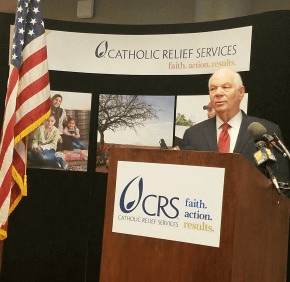Twitter: @ReviewErik
“Our desire is for the president to withdraw this executive order, for Congress to enact legislation that makes it clear that we won’t accept this, or if the courts knock down the legitimacy and legality of this – we want it gone,” Cardin, a Democrat representing Maryland, said at a Feb. 6 press conference at CRS headquarters.
The senator praised CRS, Lutheran Immigration and Relief Service, and other organizations that make Baltimore what he called “one of the major centers” for refugee advocacy and resettlement.
“We have here in Baltimore groups that understand America’s strength is in our diversity,” Cardin said. These groups “understand America’s values are very much interwoven with our commitment to help refugees around the world, and America’s leadership is indispensable in moving those programs forward.”
Bill O’Keefe, vice president of governmental relations and advocacy for CRS, said that the refugees are not terrorists but are, in fact, fleeing terrorists. He added he had received personal testimony three weeks prior from a tent-dwelling family in Iraqi Kurdistan who had just fled the Islamic State, fearing that the extremists would take their coming-of-age daughter as a sex slave or child bride.
“I’m a father; I have a daughter,” O’Keefe said. “The unspeakable horror of that possibility was something that touched me personally, and I know will touch all Americans who care about their children and who care about humanity.
“Those are the people we see around the world who are refugees and immigrants,” he added, “people who are fleeing violence – women, children and men who are fleeing violence.”
Cardin asked the media to help “put a face” on the refugee issue.
“The American people really don’t understand the refugee program,” he said. “They have to understand who these people are.”

Ashaa fled Syria with her two children and husband who is ill, according to Catholic Relief Services. Now living in Jordan, the family was one of several profiled by CRS at a Feb. 6 press conference with Sen. Benjamin L. Cardin in response to President Donald J. Trump’s executive order banning refugees from seven Middle Eastern countries. (Courtesy Catholic Relief Services)
He added that potential refugees are vetted by the United Nations before they undergo the U.S.’s 18- to 24-month vetting process.
“We are safe,” Cardin said. “Extreme vetting is already done.”
Furthermore, he argued, banning refugees is counter-productive from a national security standpoint, as such a ban could be used by extremists as a “recruitment tool” or motivation for “self-radicalization.”
“We have also heard from our friends in the Middle East that (the ban) makes it more challenging for leaders to work with the United States,” Cardin said.
CRS provided the media with background information and quotes from several Syrian refugees, such as Khaled Basheer, his wife and three children, who fled Aleppo when a bomb destroyed their house, and then lived in fear in a tent on the city’s outskirts among gunfire and explosions.
“We were also very frightened of an attack by the (Islamic State),” Basheer said, according to CRS. “We heard such horrible stories how cruelly they kill innocent people and rape women and young girls.”
The family hopes to make it to Germany.
“Daddy promised we will get a nice home there,” said Omama, Basheer’s 8-year-old daughter, according to CRS. “And he said there will be good people there.”
According to Nina Zelic, director for refugee services for Lutheran Immigration and Refugee Service, nine voluntary refugee resettling organizations, of which LIRS is one, have resettled about 37,000 refugees and special immigrant visa holders in the U.S. so far in fiscal year 2017, which started Oct. 1, 2016.
“We have four refugee cases arriving today,” she said, “including a 78-year-old Iraqi woman and a Syrian family of seven.”
“We’re extremely grateful that arrivals are resuming,” Zelic added, referring to the stay on Trump’s order, “and every day refugees are allowed into this country means that about 150 more people’s lives are saved, and that individuals are able to reunite with family and friends they thought might be lost forever.”
Cardin said that despite the stay, “we need to remain totally engaged” on the issue, which he predicts will be an ongoing battle, regardless of what happens with the current executive order.
Cardin noted Trump has “leeway” in the implementation and funding of any refugee legislation passed by Congress, which may, he said, become more “prescriptive” with such legislation.
“In the meantime, we would like the president to withdraw the order,” he said. “We’d like the courts to rule correctly – we’ll see.”
O’Keefe said the issue has “systemic” implications.
“In Lebanon, for example, and Jordan, they’re taking hundreds of thousands of refugees, with an understanding that we take just a little bit of the most vulnerable,” he said. “If we don’t play our part, it will be very difficult for them to make the tough decisions … in their societies, to play their part. And we need them to do that from a national security perspective.”
Also see:
Archbishop Lori writes letter concerning executive orders on immigration


